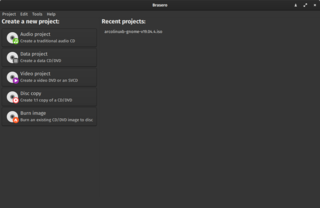
The compact disc (CD) is a digital optical disc data storage format that was co-developed by Philips and Sony to store and play digital audio recordings. It uses the Compact Disc Digital Audio format which typically provides 74 minutes of audio on a disc. In later years, the compact disc was adapted for non-audio computer data storage purposes as CD-ROM and its derivatives. First released in Japan in October 1982, the CD was the second optical disc technology to be invented, after the much larger LaserDisc (LD). By 2007, 200 billion CDs had been sold worldwide.

CD-R is a digital optical disc storage format. A CD-R disc is a compact disc that can only be written once and read arbitrarily many times.

An optical disc is a flat, usually disc-shaped object that stores information in the form of physical variations on its surface that can be read with the aid of a beam of light. Optical discs can be reflective, where the light source and detector are on the same side of the disc, or transmissive, where light shines through the disc to be detected on the other side.

Video CD is a home video format and the first format for distributing films on standard 120 mm (4.7 in) optical discs. The format was widely adopted in Southeast Asia, South Asia, East Asia, Central Asia and West Asia, superseding the VHS and Betamax systems in the regions until DVD-Video finally became affordable in the first decade of the 21st century.

Videodisc is a general term for a laser- or stylus-readable random-access disc that contains both audio and analog video signals recorded in an analog form. Typically, it is a reference to any such media that predates the mainstream popularity of the DVD format. The first mainstream official Videodisc was the Television Electronic Disc (TED) Videodisc, and the newest is the 4K Ultra HD Blu-Ray Disc. As of September 2023, the active video disc formats are Blu-ray Disc, DVD, and in other regions because of the price difference from DVD, Video CD (VCD) and SVCD.

In computing, an optical disc drive (ODD) is a disc drive that uses laser light or electromagnetic waves within or near the visible light spectrum as part of the process of reading or writing data to or from optical discs. Some drives can only read from certain discs, while other drives can both read and record. Those drives are called burners or writers since they physically burn the data onto on the discs. Compact discs, DVDs, and Blu-ray discs are common types of optical media which can be read and recorded by such drives.

A live CD is a complete bootable computer installation including operating system which runs directly from a CD-ROM or similar storage device into a computer's memory, rather than loading from a hard disk drive. A live CD allows users to run an operating system for any purpose without installing it or making any changes to the computer's configuration. Live CDs can run on a computer without secondary storage, such as a hard disk drive, or with a corrupted hard disk drive or file system, allowing data recovery.
An optical disc image is a disk image that contains everything that would be written to an optical disc, disk sector by disc sector, including the optical disc file system. ISO images contain the binary image of an optical media file system, including the data in its files in binary format, copied exactly as they were stored on the disc. The data inside the ISO image will be structured according to the file system that was used on the optical disc from which it was created.

The White Book refers to a standard of compact disc that stores not only sound but also still pictures and motion video. It was released in 1993 by Sony, Philips, Matsushita, and JVC. These discs, most commonly found in Asia, are usually called "Video CDs" (VCD). In some ways, VCD can be thought of as the successor to the Laserdisc and the predecessor to DVD. Note that Video CD should not be confused with CD Video which was an earlier and entirely different format.
Optical disc authoring, including CD, DVD, and Blu-ray Disc authoring, is the process of assembling source material—video, audio or other data—into the proper logical volume format to then be recorded ("burned") onto an optical disc.

K3b is a CD, DVD and Blu-ray authoring application by KDE for Unix-like computer operating systems. It provides a graphical user interface to perform most CD/DVD burning tasks like creating an Audio CD from a set of audio files or copying a CD/DVD, as well as more advanced tasks such as burning eMoviX CD/DVDs. It can also perform direct disc-to-disc copies. The program has many default settings which can be customized by more experienced users. The actual disc recording in K3b is done by the command line utilities cdrecord or cdrkit, cdrdao, and growisofs. As of version 1.0, K3b features a built-in DVD ripper.

The Rainbow Books are a collection of CD format specifications, generally written and published by the companies involved in their development, including Philips, Sony, Matsushita and JVC, among others.
The following comparison of video players compares general and technical information for notable software media player programs.
A cue sheet, or cue file, is a metadata file which describes how the tracks of a CD or DVD are laid out. Cue sheets are stored as plain text files and commonly have a .cue filename extension. CDRWIN first introduced cue sheets, which are now supported by many optical disc authoring applications and media players.

Brasero is a free and open-source disc-burning program for Unix-like operating systems, it serves as a graphical front-end to cdrtools, cdrskin, growisofs, and (optionally) libburn. It is licensed under the terms of the GNU General Public License.

DVD-Video is a consumer video format used to store digital video on DVDs. DVD-Video was the dominant consumer home video format in Asia, North America, Europe, and Australia in the 2000s until it was supplanted by the high-definition Blu-ray Disc; both receive competition as delivery methods by streaming services such as Netflix and Disney+. Discs using the DVD-Video specification require a DVD drive and an MPEG-2 decoder. Commercial DVD movies are encoded using a combination of MPEG-2 compressed video and audio of varying formats. Typically, the data rate for DVD movies ranges from 3 to 9.5 Mbit/s, and the bit rate is usually adaptive. DVD-Video was first available in Japan on October 19, 1996, followed by a release on June 19, 1997, in the United States.

A CD-ROM is a type of read-only memory consisting of a pre-pressed optical compact disc that contains data computers can read, but not write or erase. Some CDs, called enhanced CDs, hold both computer data and audio with the latter capable of being played on a CD player, while data is only usable on a computer.
Notable software applications that can access or manipulate disk image files are as follows, comparing their disk image handling features.

DeVeDe is a free and open-source DVD and CD authoring utility. DeVeDe produces disk images ready for authoring to CD or DVD, and allows to burn them to CD/DVD discs. The source material may be in any of a number of audio and video formats, and DeVeDe automatically converts the material to formats compatible with audio CD and video DVD standards, as used by CD and DVD player devices. DeVeDe uses other software packages, including MPlayer, MEncoder/FFmpeg, DVDAuthor, VCDImager and mkisofs, to perform the format conversions, and can use K3b or Brasero to burn an ISO image on Ubuntu, or a variety of other software on Windows.

Super Video CD is a digital format for storing video on standard compact discs. SVCD was intended as a successor to Video CD and an alternative to DVD-Video, and falls somewhere between both in terms of technical capability and picture quality.